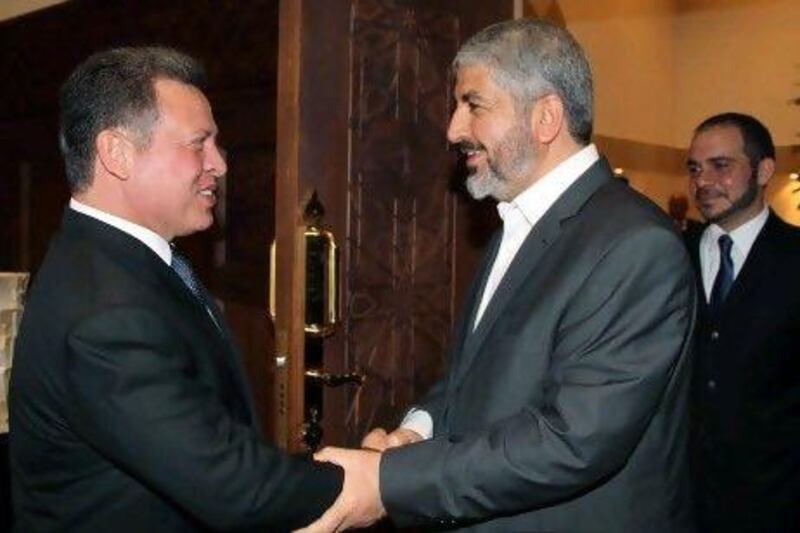AMMAN // Calls for political reform in Jordan have become shrill but they have been met with caution and indecision.
King Abdullah has formed four governments since the beginning of the Arab Spring in December 2010 as a way, critics charge, to stall reforms to tackle corruption and keep parliament disempowered.
The election of a longtime Muslim Brotherhood member as Egypt's new president may have stopped the vacillating, analysts said. Since Mohammed Morsi was declared the winner of Egypt's presidential race last month, the king has made serious attempts to appease the Muslim Brotherhood opposition in Jordan and address protests demanding change.
"You have to look at this in context of what happened in Egypt," said Mouin Rabbani, a contributing editor to Middle East Report, an online journal.
"Previously, the government felt it could marginalise the Brotherhood, but after Egypt, it feels the need to court the Brotherhood's support."
Late last month in Amman, King Abdullah had dinner with Khaled Meshaal, the leader of the Palestinian Islamist group Hamas. Mr Meshaal was on his second official visit to Jordan this year after having been expelled from the country in 1999.
The same day, the king seemed to make a gesture to the Brotherhood when he asked parliament to amend an election law that had been approved last month. Like the election law that preceded it, the new one still favours the monarchy's rural-tribal support base. It gives the Brotherhood's urban, largely Palestinian strongholds disproportionally lower representation in the parliament, even though Palestinians form the majority of Jordan's population of six million.
Only 17 of 140 parliamentary seats are allotted to political parties, which the Brotherhood wants increased significantly. On Monday, the cabinet agreed to increase both numbers, to 27 seats for parties out of 150 total in the parliament.
But that did not appease the Brotherhood.
After threatening to boycott upcoming parliamentary elections if the monarchy did not change the law, the Brotherhood yesterday confirmed it would not participate in the poll, thrusting Jordan into potential crisis.
Zaki Ershead, the group's deputy head, said the decision was made because "the regime has failed to meet reform demands by Jordanians, including the Islamist movement".
Forty-nine of the Brotherhood's Shura Council 52 members voted against the poll, he added.
Behind the scenes, Brotherhood leaders has been trying to thrash out compromises with the monarchy, said Marwan Shehadeh, an independent analyst in Amman who has close ties with the Islamist group.
Mr Shehadeh said that Hamas, which grew out of Jordan's Brotherhood, was seen by the monarchy as a tool to help convince the Brotherhood to reach a compromise.
"The government is trying to pressure Hamas to pressure the Brotherhood to participate in the new elections," he said.
"Meshaal's visit was a clear message to the Muslim Brotherhood: the government is ready to try to strike a deal," he said, adding there was still a possibility to "persuade" the Brotherhood into participating in elections.
The Brotherood boycotted the last parliamentary election, in 2010
While nowhere near the size of demonstrations in other countries, the ones in Jordan continue to smoulder. That came to a head when Jordan's reform-minded prime minister, Awn Khasawneh, was widely believed to have resigned in April because of friction with the monarchy, particularly over the election-law issue.
Introducing reforms could also blunt nationwide protests calling for an end to corruption and curbs to the king's powers.
"The more democracy we have, the safer we and our national security would be," said Musa Tamimi, 40, owner of a travel agency in Amman.
He expressed concern that without meaningful reform, public anger could turn Jordan into a tinderbox that could be ignited by events in the region.
"We are in the Middle East, and anything in the region will affect us, especially events in Egypt, Syria and Iraq," he said.
Indeed, coupled with concern about Syria's unrest spilling over into the kingdom, there is fear here of a potentially explosive situation brewing.
"Jordan has reached a phase where people are starting to get frightened," said Ahmad Nufal, professor of political science at Yarmouk University, referring to the increasingly vocal and angry demonstrations by Jordanians living in rural areas.
It is unclear, however, whether King Abdullah can convince Jordan's powerful, tribal-dominated security services to go along with reforms, especially to the election law.
Mohammed Al Masri, a researcher at Jordan University's Centre for Strategic Studies, said the monarchy sees the benefit of courting Islamists primarily in terms of foreign policy.
Improving ties with Hamas and its own Brotherhood opposition could yield better relations with an Islamist-influenced Arab world, especially Egypt.
"Keep in mind that for 10 years, Jordan was a pillar of the 'moderate Arab bloc'," he said in reference to US-backed governments in the region, including Saudi Arabia and before its revolution last year, Egypt.
"But now there is no moderate Arab bloc left after the Arab Spring, so policy has to change."
A potential consequence is strained relations with Israel. Jordan's Muslim Brotherhood opposes the country's peace treaty with Israel.
Most Jordanians do not see much value in that treaty, said Kamal Abu Jabar, a former Jordanian foreign minister. Warming ties with both the Brotherhood and Hamas, Israel's sworn enemy, may have fewer political repercussions for Amman, especially since the secular-leaning Palestinian Fatah faction had lost credibility for failing to negotiate peace with Tel Aviv after two decades of trying.
"People in Jordan understand and accept this because they understand that Israel has every intention of turning Jordan into Palestine," he said, referring to suspicions in Jordan that Israel intends to drive its Palestinians into Jordan.





